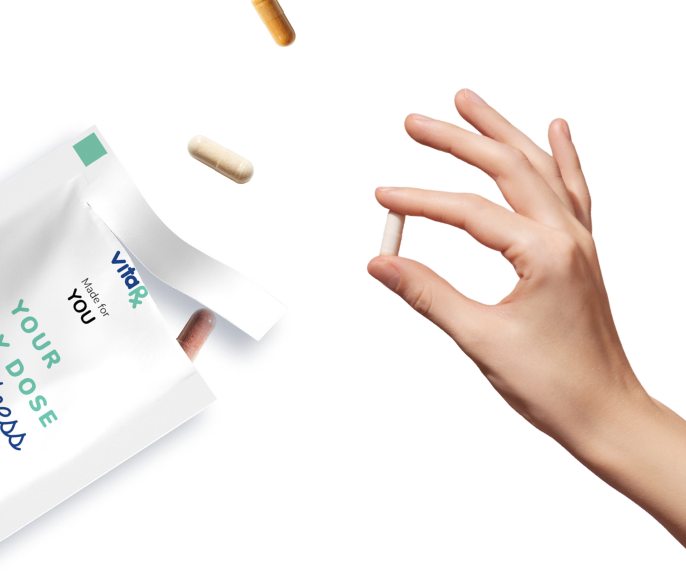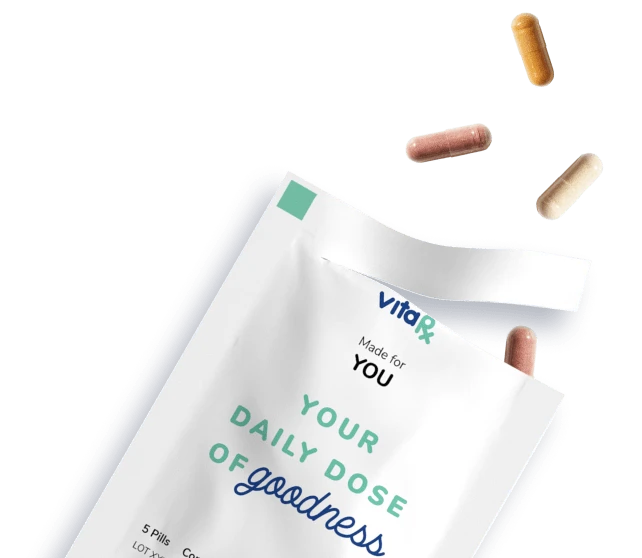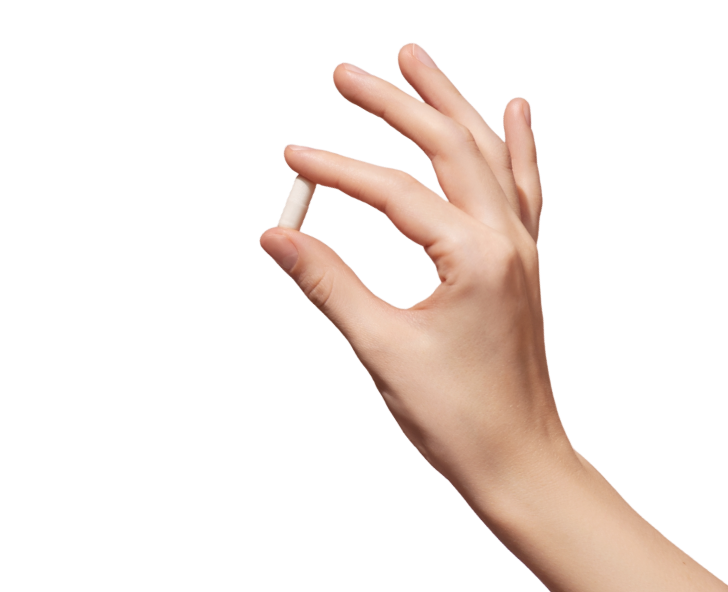Last update: April 2, 2025
7 minute read
What is Biotin (Vitamin B7) and Why Do You Need It?
What is B7? Discover the power of vitamin B7 (biotin) for healthy hair, skin, and nails. Learn about its natural sources, key benefits, and how this essential nutrient supports overall wellness.

By Derick Rodriguez, Associate Editor
Edited by Dr. Dimitar Marinov, MD, RDN, PhD

Welcome to our comprehensive guide on vitamin B7—often simply referred to as biotin or biotin B7. In this post, we explore what is biotin and dive into its essential roles and B7 vitamin benefits for maintaining healthy hair, skin, and nails, as well as overall metabolism.
You’ll discover detailed insights on vitamin B7 sources and understand the vitamin B7 benefits that make it a must-have nutrient in your daily routine. Whether you're curious about what is B7 or wondering, "can you overdose on biotin?", our guide provides the answers you need.
Key takeaways
- Biotin is a crucial B-vitamin that supports hair, skin, and nail health and energy metabolism
- Food sources rich in biotin include eggs, nuts, seeds, legumes, whole grains, salmon, dairy products, and avocados
- The recommended daily intake of biotin is 30 micrograms for adults
What is biotin (vitamin B7)?
Biotin, or Vitamin B7, is a water-soluble vitamin that's an essential part of the B-vitamin family. It plays a crucial role in helping your body convert food into energy.
In fact, research shows that biotin deficiency may lead to hair loss, brittle nails, and even skin rashes. A study published in the Journal of Cosmetic Dermatology found that women who took a biotin supplement experienced significant hair growth, especially those who had experienced hair loss.

Why is biotin a must-have for your hair, skin, and nails?
Biotin is important in the production of keratin, a protein that's essential for healthy hair, skin, and nails. So, by supporting keratin production, biotin works its magic to keep us looking and feeling fabulous!
A study found that participants who took biotin supplements experienced support in hair growth and hair shedding. Plus, other research suggests that biotin may support brittle nails and their appearance. As for skin health, biotin plays a role in maintaining the skin's moisture barrier, which helps to keep our complexion looking fresh and youthful.
VitaRx Tip
Biotin supplementation may take time to show noticeable effects on hair, skin, and nails, so be patient and consistent with your intake.
Benefits of biotin
Let's now take a closer look at the pros of biotin so that you can make informed decisions about incorporating this nutrient into your life:
- Supports hair growth and hair shedding
- Supports brittle nails and their appearance
- Maintains skin's moisture barrier for a youthful complexion
- Essential for metabolic processes and energy production
Vitamin B7 and neurological health
A recent study published in June 2024 found that individuals with Parkinson's disease have significantly fewer gut bacteria capable of producing vitamin B7 (biotin). This reduction may contribute to neuroinflammation and suggests that maintaining adequate levels of biotin could have implications for neurological health.
How does biotin actually work in your body?
Biotin is essential for several metabolic processes, including the breakdown of carbohydrates, fats, and proteins. This means that biotin helps your body convert the food you eat into energy, which is super important for maintaining our overall health.
One of the key ways biotin works is by acting as a coenzyme for carboxylases, which are enzymes responsible for crucial metabolic reactions. These reactions are necessary for the production of fatty acids, amino acids, and glucose, which are all building blocks for healthy hair, skin, and nails.
How can you get your daily dose of biotin?
Now that we've uncovered the beauty secrets of biotin, you're probably wondering how to ensure you're getting enough of it. First off, let's talk about food sources. Biotin is naturally present in a variety of foods, such as:
- Egg yolks
- Nuts and seeds (almonds, peanuts, sunflower seeds)
- Whole grains
- Dairy products (milk, cheese, yogurt)
- Meats (liver, pork, salmon)
Supplements can also help you meet your biotin needs. The recommended daily biotin intake varies depending on factors like age and gender, but for adults, it's generally around 30 micrograms. Before you take your first dose, though, it's always best to consult with a healthcare professional to ensure you're taking the right dosage for your needs.
VitaRx Tip
If you're concerned about not getting enough biotin through your diet, consider taking a supplement.
Here's a table with some of the top biotin-rich foods, along with their respective biotin content. This table will help you visualize the biotin amounts in many different foods, making it easier for you to add them to your diet and get your daily dose of this beauty-boosting vitamin.
Food | Micrograms (mcg) per serving | Percent DV* |
|---|---|---|
Beef liver, cooked, 3 ounces | 30.8 | 103 |
Egg, whole, cooked | 10.0 | 33 |
Salmon, pink, canned in water, 3 ounces | 5.0 | 17 |
Pork chop, cooked, 3 ounces | 3.8 | 13 |
Hamburger patty, cooked, 3 ounces | 3.8 | 13 |
Sunflower seeds, roasted, ¼ cup | 2.6 | 9 |
Sweet potato, cooked, ½ cup | 2.4 | 8 |
Almonds, roasted, ¼ cup | 1.5 | 5 |
Tuna, canned in water, 3 ounces | 0.6 | 2 |
Spinach, boiled, ½ cup | 0.5 | 2 |
*DV stands for Daily Value, which is a guide to the nutrients in one serving of food.
Caption: Biotin content in various food items (mcg/100g)
What are common signs of a biotin deficiency?
Biotin deficiency is uncommon since biotin vitamin B7 is widely available in many foods, and the “good” gut bacteria can usually produce enough of this B7 vitamin for your body’s needs. However, certain factors may increase the risk of deficiency:
- Hair loss (Alopecia): Noticeable thinning or shedding of hair.
- Skin issues: A scaly, red rash around the eyes, nose, mouth, and genital areas.
- Neurological symptoms: Depression, lethargy, and, in severe cases, hallucinations, numbness, and tingling in the hands and feet.
- Motor control problems: Ataxia, or a loss of control over bodily movements.
- Seizures: Although rare, significant deficiency can trigger convulsions.
- Weakened immune function: An increased vulnerability to bacterial and fungal infections.

Who is most at risk?
- Pregnant or breastfeeding women: Increased nutrient demands can lead to lower levels of vitamin B7.
- Individuals on prolonged IV nutrition: Patients relying on intravenous feeding may miss out on natural vitamin B7 sources.
- Infants on low-biotin breastmilk: Some breastmilk might not provide enough biotin, putting infants at risk.
- People with gastrointestinal disorders: Conditions that impair nutrient absorption can reduce biotin uptake.
- Smokers: Smoking has been associated with reduced biotin levels.
- Medication users: People taking certain epilepsy medications (like phenobarbital, phenytoin, or carbamazepine) or people with liver disease may also be at higher risk.
Understanding what biotin is and its deficiency symptoms is important to ensure you enjoy the full B7 vitamin benefits for overall health.
Frequently asked questions (FAQ)
Here are some of the most frequently asked questions about biotin (vitamin B7).
Final thoughts
In conclusion, knowing what is biotin and its extensive vitamin B7 benefits is key to maintaining not only a vibrant appearance—with healthy hair, skin, and nails—but also robust overall health. By including a variety of vitamin B7 sources in your diet, you can easily tap into the natural power of this B7 vitamin.
Staying informed about B7 helps you make the best nutritional decisions. Embrace the science behind biotin and enjoy its beauty and wellness benefits as part of your everyday life.
Source
Editor

Derick Rodriguez
Derick Rodriguez focuses on editing health and wellness-related content. With over half a decade of experience in the digital realm, Derick has developed a unique skill set that bridges the gap between complex health concepts and accessible, user-friendly communication. His approach is deeply rooted in leveraging personal experiences and insights to illuminate the nuances of health and wellness topics, making them more approachable and empowering readers with knowledge and confidence.
Fact checker

Dr. Dimitar Marinov
Dr. Marinov has years of experience in scientific research and preventive and clinical medicine. His publications in peer-reviewed journals are on nutritional status, physical activity, and musculoskeletal disorders among adolescents.
At VitaRx, we're not just passionate about our work — we take immense pride in it. Our dedicated team of writers diligently follows strict editorial standards, ensuring that every piece of content we publish is accurate, current, and highly valuable. We don't just strive for quality; we aim for excellence.
Related posts
While you're at it, here are some other relevant articles you might be interested in.

Get your personalized vitamin recommendations in less than
5 minutes.
Get your personalized vitamin recommendations in less than
5 minutes.







